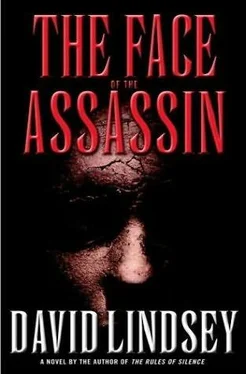David Lindsey - The Face of the Assassin
Здесь есть возможность читать онлайн «David Lindsey - The Face of the Assassin» весь текст электронной книги совершенно бесплатно (целиком полную версию без сокращений). В некоторых случаях можно слушать аудио, скачать через торрент в формате fb2 и присутствует краткое содержание. Жанр: Триллер, на английском языке. Описание произведения, (предисловие) а так же отзывы посетителей доступны на портале библиотеки ЛибКат.
- Название:The Face of the Assassin
- Автор:
- Жанр:
- Год:неизвестен
- ISBN:нет данных
- Рейтинг книги:4 / 5. Голосов: 1
-
Избранное:Добавить в избранное
- Отзывы:
-
Ваша оценка:
- 80
- 1
- 2
- 3
- 4
- 5
The Face of the Assassin: краткое содержание, описание и аннотация
Предлагаем к чтению аннотацию, описание, краткое содержание или предисловие (зависит от того, что написал сам автор книги «The Face of the Assassin»). Если вы не нашли необходимую информацию о книге — напишите в комментариях, мы постараемся отыскать её.
The Face of the Assassin — читать онлайн бесплатно полную книгу (весь текст) целиком
Ниже представлен текст книги, разбитый по страницам. Система сохранения места последней прочитанной страницы, позволяет с удобством читать онлайн бесплатно книгу «The Face of the Assassin», без необходимости каждый раз заново искать на чём Вы остановились. Поставьте закладку, и сможете в любой момент перейти на страницу, на которой закончили чтение.
Интервал:
Закладка:
“Get to the goddamned point, Lex.”
“Ghazi Baida’s about to get a little jolt of enlightenment,” Kevern said, grunting under his breath. “He’s about to find out that Jude’s not dead after all.”
Chapter 8
Lex Kevern was still holding the remote control for the CD player. After the television screen had gone dark, the room had returned to its cool blue glow.
But now Richard Gordon wanted to see Kevern’s face clearly. He was sitting next to a table lamp, and he reached up and turned it on. Instantly, the weak incandescent bulb threw a sallow cast over everything. Kevern’s suntan turned dark and leathery.
Heavy Rain, like many clandestine operations, was straightforward in its concept but complex in its execution. The objective was to put someone very near the inner circle of Ghazi Baida, a much-feared Hezbollah terrorist who U.S. intelligence was now placing in and out of South America’s Triple Border region. This territory, a dense jungle no-man’s-land where the Iguacu and Parana rivers meet at the converging borders of Brazil, Argentina, and Paraguay, had become a lawless sanctuary for international criminals and terrorists. It was feared that Baida had targeted the United States and was laying the groundwork in the Triple Border region for operations that would be launched from bases in Panama, Venezuela, and Mexico.
A CIA operations officer, Jude Lerner, was put into play, posing as an artist from Texas and using the alias Jude Teller. He became a fixture in Mexico City’s large arts community. He began to hang out at a lap-dancing club in the Zona Rosa that was frequented by Ahmad Rahal, one of two principals in a cell that had been tied to Baida. Over time, the two men became friends, and eventually Jude let Rahal in on his little sideline: trafficking in stolen pre-Columbian artifacts.
Gordon’s people in Washington had backstopped an entire smuggling operation set up by Kevern’s people over a period of six months. They had created routes, contacts, covers, informants, buyers, everything needed to support a smuggling network that stretched from the jungles of Guatemala’s Peten, where Jude bought artifacts from Mayan Indians who raided archaeological sites, to Houston, the destination of the merchandise and its distribution point.
When Ahmad expressed an eager curiosity about Jude’s operation, Jude invited him along on a couple of trips, and Ahmad got a firsthand look at Jude’s entire system. Shortly after the second trip, Ahmad introduced Jude to the cell’s leader, Khalil Saleh. After another month of wary association, Khalil was also shown the smuggling route, and very soon afterward, it was mentioned to Jude that they were looking for a safe conduit into Texas for certain items. Would Jude be interested? The Texan was always interested in making a tax-free dollar.
Eventually, Khalil took Jude to Paraguay’s Ciudad del Este, located in the Triple Border region, and introduced him to Baida. Suddenly, security backstop flutters were rippling all the way back to the second level of Jude’s layered legend. Baida was looking into him in a serious way. When that didn’t throw up any flags, Baida called Jude back to Paraguay. At the third meeting, Baida agreed to move some contraband in a trial run through Jude’s underground system.
But when Jude returned to Mexico City from his last trip to Ciudad del Este, he disappeared. Now here was confirmation of what had happened to him, but for some reason, Kevern had withheld this information from Langley for four weeks. Now Gordon was waiting for an explanation.
After his last enigmatic statement, Kevern was silent. He leaned forward, resting one elbow on the arm of his chair. Gordon could hear him softly grunting under his breath, a big animal, forced to make nice in an environment that constrained and frustrated him. But he was calm. When Kevern was getting close to something he wanted, he became very placid. Achieving proximity to his prey was like putting him on ice. His metabolism dropped to the level of a scorpion’s.
Finally, Kevern nodded. “Turn off that light,” he said. “You need to see something else.”
Again the screen came alive in a fluorescent haze of static. The images were indistinct at first, and this time the dateline indicated a period twenty-four hours after the first recording.
The opening images are murky and then a door is flung open to a lighted room-the same room as in the first recording, but this time the camera is being held by someone coming into the room. Khalil, the bald man, and the two Koreans wheel around in stunned surprise. The camera hurtles into the room behind the intruders, who are clad in black balaclavas. They begin firing their automatic weapons immediately, and then receive a few bursts of fire from two of Khalil’s men, who rush into the room through another door. The intruders spray the room with more automatic-weapons fire, and everyone in the room is down in less than fifteen seconds. The black-hooded intruders then methodically go to each of the victims and finish them off with short bursts at point-blank range.
The bald man, still dying, is recorded up close, black-gloved hands lifting his head off the floor and holding his face straight so that he can be identified. The dead Khalil is also recorded up close for identification, as are each of the three Koreans and the two other men. Three times, a shirt is lifted and pants are pulled down to record tattoos or scars to corroborate the ID.
Someone gathers up piles of money on the table around which the men had been gathered, as well as a dozen kilo packages of drugs stacked beside the money. Then the handheld camera records the removal of the ceiling-high surveillance camera that had been secretly mounted in the corner by the Agencia Federal de Investigaciones, and which had captured the previous recording. One last pan of the silenced room, and the images end.
Kevern snicked off the CD player and the television.
Gordon sat in stunned silence. The entire cell they had spent nearly a year to penetrate was gone in less than five minutes.
He suspected he knew what he had just seen, but he stopped himself from saying so. He had to hear this out. He had to wait and take it as it came, and he had to read very closely between the lines. He wanted Kevern to explain every step of this, everything, especially the stuff Gordon thought he had already figured out.
He reached up and flipped on the lamp again. This time, he wanted to see everything Kevern’s face had to offer, though it seldom offered much.
Kevern, grunting, sat up in his chair and leaned forward a little.
“Unlike his Muslim buds, Baida’s never been squirmy about the ethics of drug trafficking to finance his operations.” He nodded toward the television. “That’s what Khalil was doing here. Hezbollah’s accelerating its initiatives in South America. Those crumbling economies down there are like fertilizer to organized crime, and Hezbollah’s sucking into that.
“My guess is that Baida’s turning some of the people from those criminal organizations into surrogate soldiers. They’ve got the infrastructure he needs for transborder operations. They’ve got no national or religious loyalties. They’re greedy, so their services go to the highest bidder, and with the drug money, Baida can bid high. They’re ideal terrorist mercenaries.”
Kevern paused. Gordon could hear him breathing, as if his lungs and throat were laboring under the compression of secrecy.
“This is our situation: Until Jude, we’d never been able to make any headway getting inside one of Baida’s damn cells because of his obsession with three things: compartmentalization, decentralized organization, and fractured communication.” He paused for emphasis. “And those are exactly the things we’re going to use to bury him.”
Читать дальшеИнтервал:
Закладка:
Похожие книги на «The Face of the Assassin»
Представляем Вашему вниманию похожие книги на «The Face of the Assassin» списком для выбора. Мы отобрали схожую по названию и смыслу литературу в надежде предоставить читателям больше вариантов отыскать новые, интересные, ещё непрочитанные произведения.
Обсуждение, отзывы о книге «The Face of the Assassin» и просто собственные мнения читателей. Оставьте ваши комментарии, напишите, что Вы думаете о произведении, его смысле или главных героях. Укажите что конкретно понравилось, а что нет, и почему Вы так считаете.












